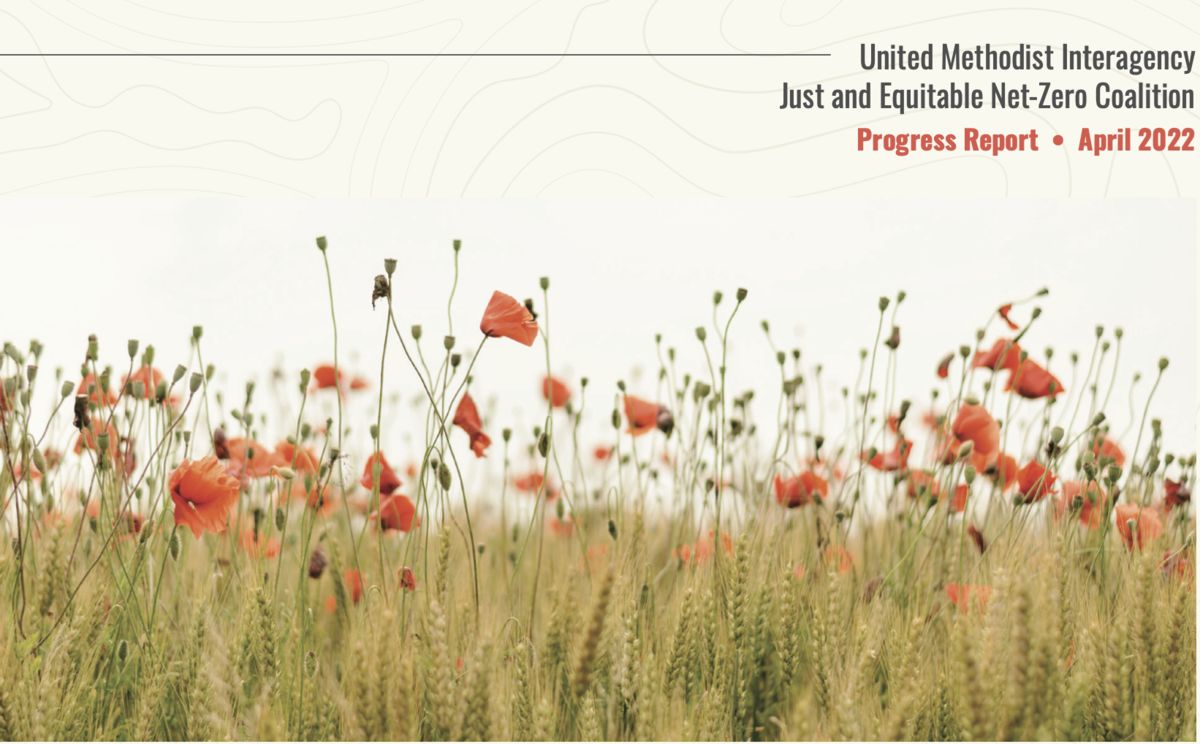United Methodist Interagency Just and Equitable Net-Zero Coalition Issues Progress Report
This is the first report for The United Methodist Interagency Just and Equitable Net-Zero Coalition

The United Methodist Interagency Just and Equitable Net-Zero Coalition has published its first progress report a year after setting a goal of just and equitable net-zero emissions by 2050.
On Earth Day 2021, a group of United Methodist general agencies and commissions announced a commitment to reduce greenhouse gas emissions from their ministries, facilities and operations and to do so through a lens of justice and equity. The coalition is working together as they learn to measure greenhouse gas emissions generated through their ministries and identify emission reduction strategies that support the flourishing of all communities.
Training opportunities in 2021 included an overview of the Greenhouse Gas Protocol reporting framework, training on how to use EnergyStar Portfolio Manager (a tool that tracks energy use and emissions from buildings) and an exploratory discussion on how to center equity and justice within efforts related to net-zero. Education, training and skills development will continue in 2022.
While net-zero emissions is a long-term goal, the agencies will individually set short- to medium-term targets to track progress. Initially, coalition members are setting baselines to understand the sources and quantity of emissions. This knowledge will guide the creation of interim goals and emission-reduction strategies. Ongoing tracking over time will help identify what’s working and where to focus next. Because each agency generates emissions differently, the scope and focus of those strategies will vary.
Leaders within each agency are actively engaged in identifying effective strategies and systems for measurement and implementation. The progress report includes summaries from each agency on their current efforts.
“As we set up systems for measuring and tracking the emissions we generate, we’re developing strategies to reduce them,” said the Rev. Jenny Phillips, senior technical advisor for environmental sustainability at Global Ministries. “From energy efficiency interventions in offices to integrating sustainability practices into our many expressions of ministry, we are determined to shrink the climate impact of our ministries in the short-term and eliminate it in the long term.”
As agencies and commissions develop plans to reduce emissions, they will also identify ways to seek to address systems that reinforce and maintain injustice. “Simply attaining net-zero emissions could perpetuate the burden on communities that are suffering from our systems of extraction, production and waste,” states the report.
Supporting a just and equitable transition that advances racial and gender equity begins with assessing how physical facilities and current practices are connected to communities and ecosystems. For example, how do energy sources impact neighbors near and far – and how should that impact determine the choice of alternative energy sources?
“Black, Indigenous and people of color communities, low-wealth communities, and areas of the world least responsible for climate pollution have already been disproportionately burdened by our current energy economy,” says Elizabeth Chun Hye LEE, executive for economic and environmental justice and climate justice lead at United Women in Faith. “As United Methodists, we reject the narrative that we must get to net-zero at any cost. As agencies, we have the opportunity to work with communities most impacted and to invest in solutions that dismantle existing structural barriers to racial and gender equity in order to build resilient flourishing communities.”
One note that came through clearly from agency responses is that the pandemic has transformed workplaces. The shift to hybrid or remote work creates new challenges and opportunities in emissions management. Over the past two years, many agencies and commissions have experienced emission-reducing transitions, including selling and consolidating office space. Some that share office space are considering how to work together on tracking emissions. In addition, as travel and in-person events begin to resume, agency leaders are looking at integrating emission reduction strategies into their planning.
“Net-zero is an important goal that will require collaboration and innovation within the broader church and beyond,” said Wespath’s Director of Sustainable Investment Stewardship, Jake Barnett. “Our agencies look forward to continuing to partner and learn from each other’s differentiated expertise as we work to bring about the systemic change that will support a just and equitable net-zero future.”